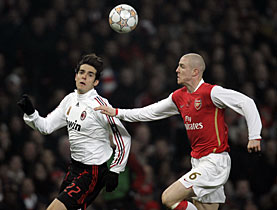Football and pride through the eyes of Gökhan Inler

Gökhan Inler, the powerful midfielder for the Italian club Udinese Calcio cannot wait to don the Swiss jersey for the European football championships. The match against Turkey on June 11 will be particularly significant for the player..
Inler had a lot of personal success last season, winning a first team spot at his adopted hometown of Udine, in northeast Italy. He hopes that 2008 will also be a memorable year for the Swiss national team.
A few weeks before the start of the Euro 2008 contest, swissinfo spoke with Gökhan Inler about his feelings and expectations for the tournament.
swissinfo: What does Euro 2008 mean to you?
Gökhan Inler: I think that every player would like to be in this tournament. It is a unique opportunity. Whoever has the opportunity to play in this tournament must just be thankful and give it all for their country’s team.
From the Swiss perspective, the expectations of the fans are obviously very big, because we are playing at home. This support is very important for us. And for our part, we will do everything to start the tournament in the best way and to not disappoint.
swissinfo: In the group matches, Switzerland will meet the Czech Republic, Turkey and Portugal. How are you evaluating these opponents?
G.I.: It is certainly a strong group. On the other hand, everyone in the European championship is a strong opponent. If we want to achieve our goals, we have to play at the level of the other teams. If we are filled with anxiety when we meet our opponents, we need not even step onto the field.
I would therefore not concern myself with the strengths and weaknesses of the individual teams that we will meet in the group stages. They all have their strengths, to varying extents. We simply have to give the maximum in the first group stage and move on to the next round.
swissinfo: On June 11, you will meet Turkey. Does this game have a special meaning for you?
G.I.: Certainly, this is a very special match for me, because I have Turkish roots. I personally know some players on the Turkish national team, and I cannot wait to play against them. It is a very emotional issue. But, I will play this game exactly the like every other challenge in my career. This means I will do my best on the field.
swissinfo: On September 2, 2006, you played for the first time on the Swiss national team. How important is wearing the national jersey?
G.I.: The decision to play for the Swiss national team was very important for me. I chose to play for Switzerland out of gratitude. I have received a lot from this country and I wish to be able to give something back.
This is a job I take seriously. I am diligently preparing and focusing very hard.
swissinfo, based on an interview in Italian by Andrea Cementi
Göhkan Inler was born on June 27, 1984, in Olten, canton Solothurn. He grew up with his parents and his brother, Volkan.
At the age of six, he started to play football in a youth club in his hometown. At age 16, he began playing for FC Solothurn.
The club FC Basel noticed the young midfielder and in the 2004-05 season, he played with the under-21 team in that city. A year later, he wore the jersey of FC Aarau in the Swiss Super League and also played with the under-21 national team.
In 2006, he moved to FC Zurich and won the national championship. After another title in 2007, he decided to try his luck abroad. His Italian debut was in August 2007 against Inter Milan at the San Siro stadium. Two months later, he scored his first goal for Udinese against Juventus.
Switzerland will co-host the Euro 2008 football tournament together with Austria from June 7-29.
The 31 games will be played in four cities in Switzerland (Basel, Bern, Geneva and Zurich) and four cities in Austria (Innsbruck, Klagenfurt, Salzburg and Vienna).
Up to 5.4 million football fans are expected to follow the tournament in Switzerland, including 1.4 million from abroad.

In compliance with the JTI standards
More: SWI swissinfo.ch certified by the Journalism Trust Initiative











You can find an overview of ongoing debates with our journalists here . Please join us!
If you want to start a conversation about a topic raised in this article or want to report factual errors, email us at english@swissinfo.ch.